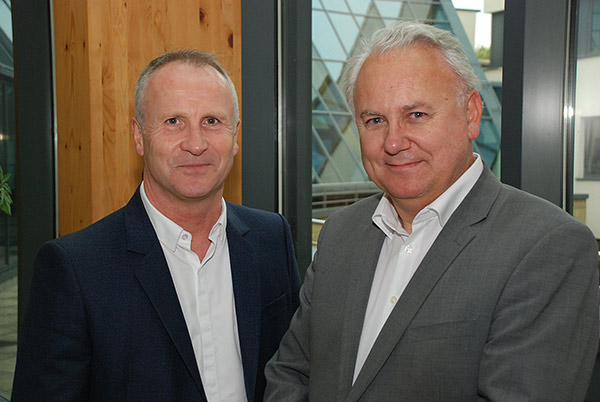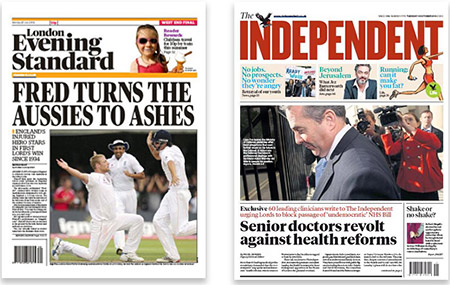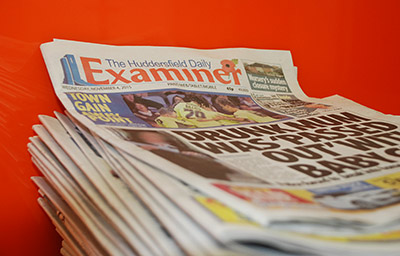Niche markets and quality products – the future for newspapers
 The Chief Executive of the Independent and Evening Standard newspaper group, Steve Auckland (left), is pictured above with Dr Stephen Dorril from the Department of Journalism and Media.
The Chief Executive of the Independent and Evening Standard newspaper group, Steve Auckland (left), is pictured above with Dr Stephen Dorril from the Department of Journalism and Media.
Thu, 05 Nov 2015 00:01:00 GMT
Steve Auckland, Chief Executive of the Independent and Evening Standard newspaper group, gave his thoughts on the industry to the University’s media and journalism students
 LOCAL daily newspapers will be a thing of the past and inevitably become weekly publications, said the Chief Executive of the Independent and Evening Standard newspaper group, when he came to give a guest lecture to students at the University of Huddersfield on the current state of the newspaper industry and its future.
LOCAL daily newspapers will be a thing of the past and inevitably become weekly publications, said the Chief Executive of the Independent and Evening Standard newspaper group, when he came to give a guest lecture to students at the University of Huddersfield on the current state of the newspaper industry and its future.
In a room full of journalism and media undergraduates, Steve Auckland specifically spoke about Huddersfield’s local paper and said: “The Huddersfield Examiner is a great product in many ways, but would it be better off as a weekly? In my personal opinion, yes it would, because you could have a great product once-a-week and a brilliant 24/7 website.”
Mr Auckland, who still lives in Huddersfield, is known by many as turning around the fortunes of the free newspaper, Metro, of which, when he joined in 2002, had yet to make a profit. He was the Managing Director until 2011 and enjoyed continuing success by doubling the paper’s readership and profitability over the years of working there.
Before joining the Independent and Evening Standard newspaper group in 2014, he ran Northcliffe Media, the regional newspaper group owned by Daily Mail & General Trust(DMGT). Within an 18-month period, he changed the company dramatically by bringing in new management and editorial teams and made the controversial, but successful decision, of changing four of its most well-known dailies into weekly newspapers.
 Mr Auckland freely admits his suggestion of the Huddersfield Examiner becoming a weekly publication will not be welcomed.
Mr Auckland freely admits his suggestion of the Huddersfield Examiner becoming a weekly publication will not be welcomed.
“People do not like the change of going from a daily to a weekly; they think the town is missing out on news,” he said. “But the reality is you can get this news 24/7 by willingly inputting daily news onto the newspaper’s website, and then the higher-quality weekly product brings in the profits,” he added.
Talking about the future of newspapers nationally, according to Mr Auckland, the industry will become a captive market and be targeted towards more niche audiences. For example, by buying the Daily Mail, said Mr Auckland, you would be purchasing into a right-wing product to back up your beliefs and thoughts.
During a question and answer session with the students, Mr Auckland mentioned how he welcomed the effects of social media across the newspaper industry and stated that 35 to 40 per cent of the traffic driven to his newspaper group’s websites came through social media.
 Nearing the end of the session, he acknowledged there needs to be an extra push to take on younger journalists and editors, if engaging content is to be continually created for particular target markets.
Nearing the end of the session, he acknowledged there needs to be an extra push to take on younger journalists and editors, if engaging content is to be continually created for particular target markets.
“The average age of a reader of the Independent is 50-years-old and over. The average age of a reader of the London Evening Standard is 35-years-old,” said Mr Auckland.
“To put this into context, some of our journalists are 55 to 60-years-old writing for an audience almost half their age. We know it’s an issue and we need younger journalists to join the business to keep giving the readers what they want,” he added.
Mr Auckland closed the session by saying: “Will the industry be around in 10 years time? Of course it will.
“However, I think there will be more niche publications than ever, targeting particular markets and targeting those particular markets really well. This will be the way to commercially make quite a lot of money.”







